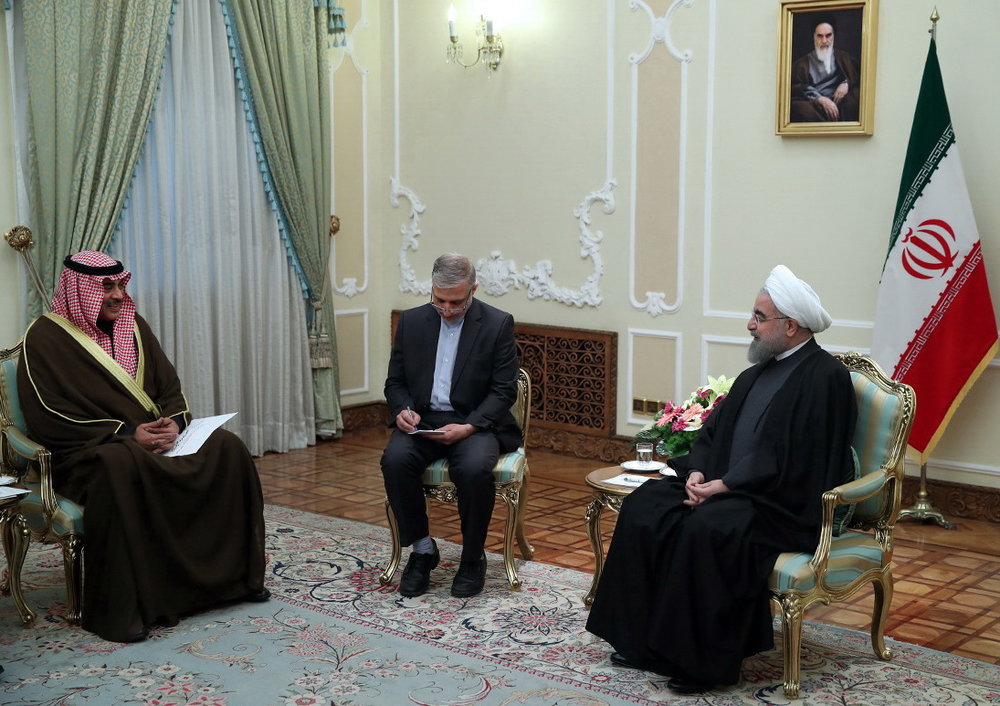Kuwait delivers message on Iran-Arab dialogue

TEHRAN – Kuwait’s foreign minister arrived in Tehran on Wednesday to deliver a massage to President Hassan Rouhani of Iran, an initiative expected to bring about a thaw in relations between Tehran and the Persian Gulf Arab states.
The formal visit comes days after Rouhani, in remarks on Jan. 17, said a dozen of countries, including Iraq and Kuwait, had offered mediation to reconcile Saudi Arabia and Iran.
Also, in remarks on Monday Iran’s Foreign Ministry spokesman Bahram Qassemi said the Kuwaiti official carries a message to Rouhani.
Meeting Foreign Minister Sheikh Sabah Khaled al-Sabah, Foreign Minister Mohammad Javad Zarif hailed positive part played by Kuwaiti Emir Sheikh Sabah Al-Ahmad Al-Jaber Al-Sabah in strengthening relations among regional countries and called for closer cooperation between the two Persian Gulf countries.
“The Kuwaiti emir’s role in boosting neighborliness among regional countries is commendable,” he added.
For his part, the top Kuwaiti diplomat highlighted Iran’s regional and international importance, emphasizing historical, cultural and religious affinities between the two nations.
Kuwaiti news agency KUNA quoted Foreign Minister Sheikh Sabah Khaled al-Sabah as saying before heading to Iran that relations between Iran and the six Arab states bordering the Persian Gulf Cooperation Council "must be based on the UN Charter and principles of international law".
No details of the message have been given.
Mediation efforts by regional and international actors have failed to ease the tension.
Iran has reiterated that it is open to a détente provided that the Saudi side shifts to a positive political posture.
“If Saudi Arabia makes serious changes to its behavior toward Iran, and we perceive it, then, it can open the way for other issues,” Qassemi underscored on Monday.
Over the past years, tensions between Iran and some Arab states have reached a level unseen since the Iraqi invasion of Iran in the 1980s.
Relations between Iran and Saudi Arabia, two regional poles, have deteriorated over the past few years, with each vying for more regional influence.
The Syrian crisis opened the Pandora’s Box in 2011, inserting feud between Riyadh and Tehran.
While Tehran takes sides with President Bashar al-Assad, Saudi Arabia and some Arab countries demand Assad step down.
The animosity has been going for five years now, showing no sign of abatement.
Disagreements over a hajj crush in Mina during which more than 464 Iranian nationals were killed have further complicated the situation.
The sides recently agreed to start talks on Hajj.
In January 2016, Riyadh summoned its diplomats from Tehran after its diplomatic posts in Tehran and Mashhad were attacked by angry people.
The attacks came as a retaliation for the country executing a prominent Shiite cleric critical of the House of Saud.
Bahrain followed suit, cutting ties with Iran although other Arab countries only downgraded the level of their diplomatic ties.
AK/PA
